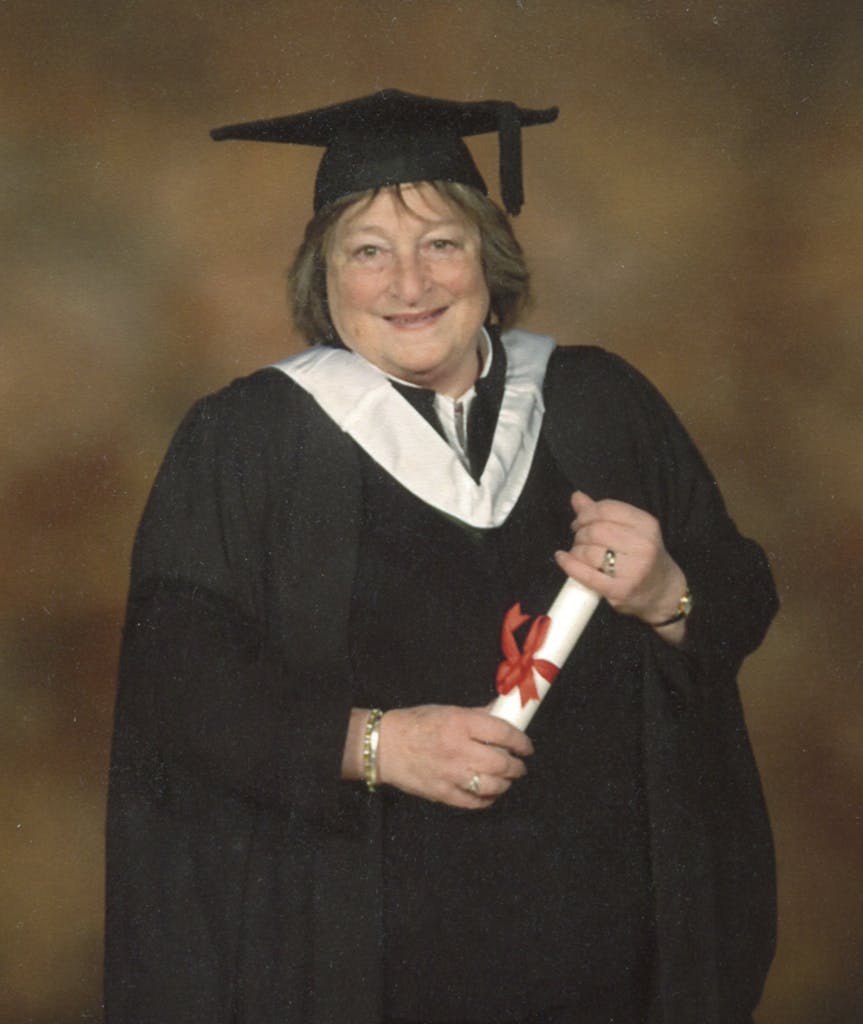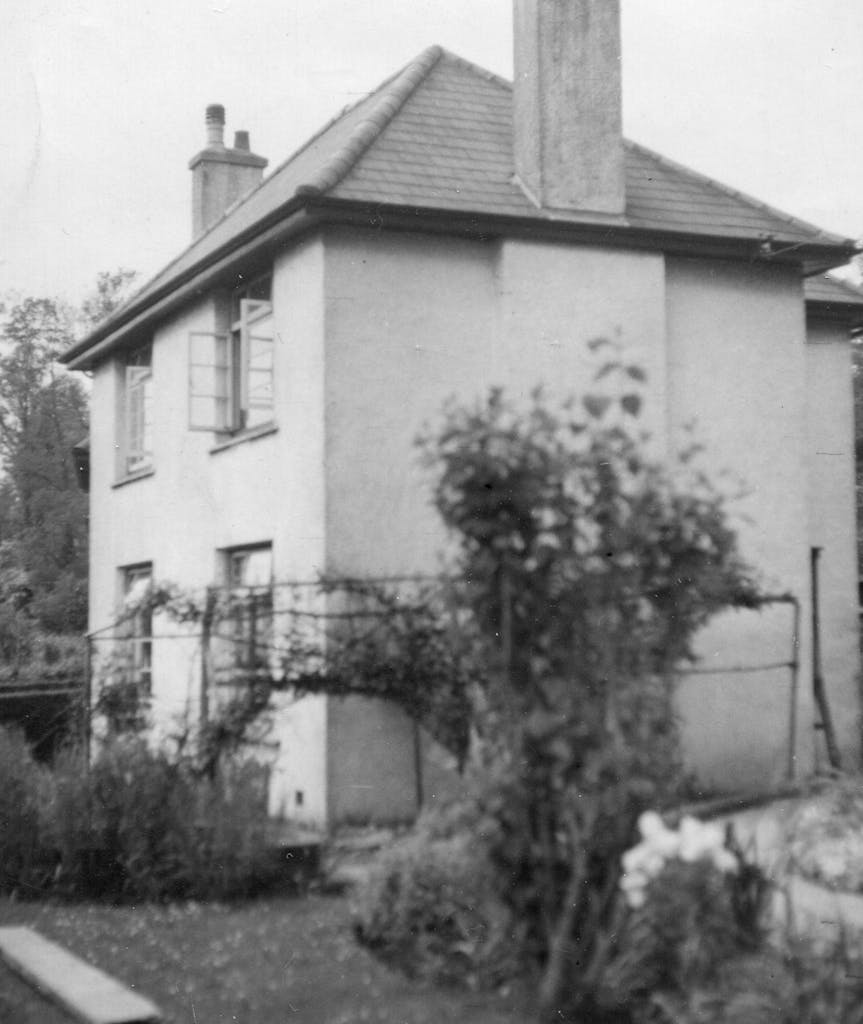Iby Knill
Iby fled to Hungary to escape Nazi-occupied Czechoslovakia, but was later deported to Auschwitz-Birkenau. She was liberated on a death march on Easter Sunday 1945.



Born in 1923, Iby grew up in an educated, cultured family where she and her brother, Tomy, spoke several languages. Religion played little part in Iby’s childhood. She attended a German grammar school where she flourished. When the pro-Nazi Slovak puppet regime implemented a version of the Nuremberg laws in 1939, she was forced to transfer to a Jewish school.



After the German occupation of Czechoslovakia in late 1938, Iby’s life became increasingly restricted. Jewish people were no longer allowed to sit on public transport and Iby particularly hated wearing the yellow star – she would cover it with her scarf as she walked to school. lby’s parents’ business was also ‘Aryanised’ and her family was forced out of their apartment after it was allocated to a German family. They were given a tiny flat on the outskirts of town.
At the end of January 1942, Iby’s mother was notified by a friend that many young women were being rounded up by German authorities for prostitution on the Eastern Front. Iby hid for several days at her grandparents’ house, while her parents made arrangements to get her to safety.

“We cycled part of the way and we then walked, it was February 1942, and everything was frozen and cold, and then crawled across no-man’s-land into Hungary.”
Iby crawled across no-man’s land into Hungary in the middle of the night. Iby, now aged 18 and considered an illegal immigrant, went to her aunt Bella in Budapest, who feared repercussions and so refused to help her. Iby instead hid in the apartment of another cousin, Marton, for several weeks.

Iby then lived with a solicitor and his family. He was also a member of the Hungarian resistance and Iby agreed to help by using her knowledge of English language to assist Allied airmen to escape Hungary. Eventually, the resistance group was caught. Iby spent a fortnight at the police station and three months in a prison before being released. She was then immediately re-arrested as an illegal immigrant and sent to a refugee camp to work as a farm labourer. During her various internments, she volunteered as a nurse and used her skills wherever possible to help her survive.




In 1944 Iby was sent to Auschwitz-Birkenau. After arriving, Iby was shaved, showered, and given a prisoner uniform before entering the camp. Her language skills were very useful in Auschwitz, as it meant she could communicate in German with the guards, which sometimes resulted in better rations. However, this did not protect her entirely; Iby developed a hip condition and she ended up in the camp’s hospital. It was then that she underwent X-ray experiments.
Iby only stayed in Auschwitz for six weeks, because she and some friends volunteered to accompany a slave labour transport to an armament factory in Lippstadt, Germany. They were forced to make armaments for the German war effort. Where possible, Iby and her friends would sabotage the work. Eventually, Iby was put in charge of the camp hospital due to her fluency in German and informal nursing skills.
In March 1945, the hospital unit was evacuated and Iby and the other women were taken on a death march towards Bergen-Belsen. Anyone who couldn’t keep up was shot. lby had a renewed infection in her hip and credits her survival to her friends who carried her along the way. Iby was finally liberated by the American army on Easter Sunday 1945.
Iby’s mother and brother both survived the war and returned to Bratislava. Iby spent some time recuperating in hospital and then began working as a translator and interpreter for the Allied Military Government in Germany. In September 1946, she returned to live with her mother and brother in Bratislava. Her father perished in Auschwitz.






While working for the British, Iby met Bert Knill, a British officer. They married in Bratislava in December 1946 and moved to England in March 1947. They raised two children, as well as two stepsons from Bert’s previous marriage.
Iby had varied careers, working in civil defence training and the education sector, and later as a language tutor, translator, and textile designer. In 1973, she earned her BA, and then her MA in 2002, at the age of 79. Iby wrote about her wartime experiences within two autobiographies, The Woman Without a Number (2010) and The Woman with Nine Lives (2016).
Iby shared her story to young people to spread her message of acceptance and inclusion:

“To teach young people to accept differences, to understand them and to honour them, and unless young people learn that, there is really no future for civilisation because genocide in one shape or another will take place.”
In recognition of her lifetime charity work, she was awarded the British Empire Medal for Services to Holocaust Education and Interfaith Cohesion in the Queen’s Birthday Honours List in 2017. She was also awarded an honorary doctorate from the University of Huddersfield in 2016 and Honorary Fellowship from Leeds Trinity University in 2018.
Iby sadly passed away, aged 99, in 2022. Her website remains online at ibyknill.co.uk

Can you help us?
Without the work of charities like ours, stories like Iby Knill's will be lost and forgotten. Please donate generously to ensure that Iby's story can a force for good in the modern world.
- £
